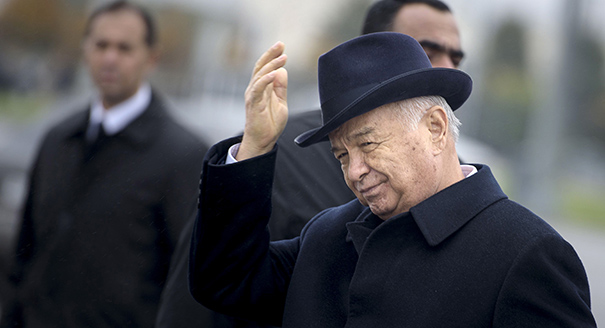The average age of a citizen of Uzbekistan is 27.1 years old. That is exactly the number of years Islam Karimov has ruled his country.
Now, Central Asia’s most populous state faces a classic scenario: its seemingly perpetual ruler is seriously ill, rumored to have died already. Karimov, who has led Uzbekistan since even before it gained independence in 1991, looks set to leave the stage without having picked a successor—perhaps fearing that that successor would have hastened his own demise.
What happens to a country whose people for the most part have never known another leader when that leader leaves? The ruling bureaucracy often sets aside its internal quarrels and unites in an instinct of self-preservation. Sometimes they need to draw support from the people, and an internal power struggle becomes public, which makes democratization possible.
Uzbekistan is only the first of the Central Asian states to face these scenarios. The stability of its neighbors also pretty much fluctuates relative to the blood pressure of their presidents. Kazakhstan seems to be constructed on more rational and predictable lines, but its future strongly depends on its leader’s health. Tajikistan and Turkmenistan are in the same boat. The autocratic leaders of these two republics are not that old, but they are also mortal. If threats of regime breakdown materialize, Russia will have to deal with refugees, ethnic strife, and religious wars almost unaided. The Chinese certainly won’t come to the rescue.
When an imminent succession crisis threatens a country that has been ruled for a long time by one leader, the dictator’s inner circle is sometimes not ready. They try to do everything medically possible to keep the old man alive, thus giving themselves more time to jostle for the title of successor. In that process some of the competitors may get eliminated, not being particularly young themselves. That was what happened with Leonid Brezhnev in the early 1980s. His health gravely deteriorated in the last seven to eight years of his life, but his associates did not want him to retire full-time to his dacha in Zavidovo. They forced him to spend three days a week running the country.
But when the fateful day dawns, a series of things generally happens. First, no one knows whether the leader is actually alive or dead (as is the case in Uzbekistan at the moment). In the latter case, people learn about it after a delay, while they are being conditioned to accept the inevitable by listening to news reports about the leader’s ever-changing medical condition. During that time, the strongest person gets a chance to crush his opponents (whether figuratively or literally) and take charge of the funeral arrangements. Alternatively, several weaker figures may get together to crush the strongman and take collective charge of the funeral ceremony.
If there is no obvious master of ceremonies, the ruling elite tends to stick together and put aside its quarrels so as to keep power in the family and not allow it to slip away, while the masses are in a state of confusion.
When the people finally get used to being orphaned and to being ruled by a clique of followers of the late leader, there are two options. Either the elite works out who is the most loyal disciple of the late ruler. Or else it begins to take a critical look at the legacy of the deceased and allows itself to suppress the most loyal devotees of that legacy. The population will be split. Some will be happy with the revisionism, having always seen the worst traits of the departed leader. Others will be unhappy to see dirty laundry aired in public. But both groups will be glad to see a purge of those who keep the old flame burning.
This scenario can be thwarted by relatives of the old leader who are both politically active and financially secure. This did not happen in the Soviet tradition, but it did in Yugoslavia, where the faithful Jovanka Broz staked her claim on her late husband’s political legacy. In Spain, General Franco personally removed his relatives from the list of potential successors so that they didn’t meddle in contemporary politics. The truth is that while the people often love their leaders, they rarely feel the same way about their families (just look at Hosni Mubarak and his son in Egypt).
The death of a leader and a succession struggle can even bring about democratization. Deprived of the prop of the leader’s authority, which inevitably accrues to him when the number of years he spends in power are equivalent to the average age of the country’s population, the protectors of his legacy or the revisionists are forced to draw support from the people—not just the army, navy, and road police. An internal power struggle becomes a public one, and from there it is only one step to an era of glasnost. For sure, the victor can then put a cap on democratic change, which has already served its function, claiming that freedom must have limits.
Sometimes the power struggle lasts for the entire transition period, so real political institutions start taking shape. And in this period, youth may take to the streets. Young people tend to be politically active, especially if they are economically insecure. In countries where the average age is 27.1, they are rarely satisfied with the way they are living. Pretty much anyone, except the official successors of the leader, can end up in charge of the youth crusade. It could be religious fanatics, whose organizations are prohibited in Russia and beyond, or less bloodthirsty activists.
Change is coming for sure to Uzbekistan and the rest of Central Asia. The only thing that is unclear is what kind of change and what kind of succession awaits these countries. Russia definitely needs to factor this imminent change and the age of the leaders of the region into its domestic and foreign plans.
